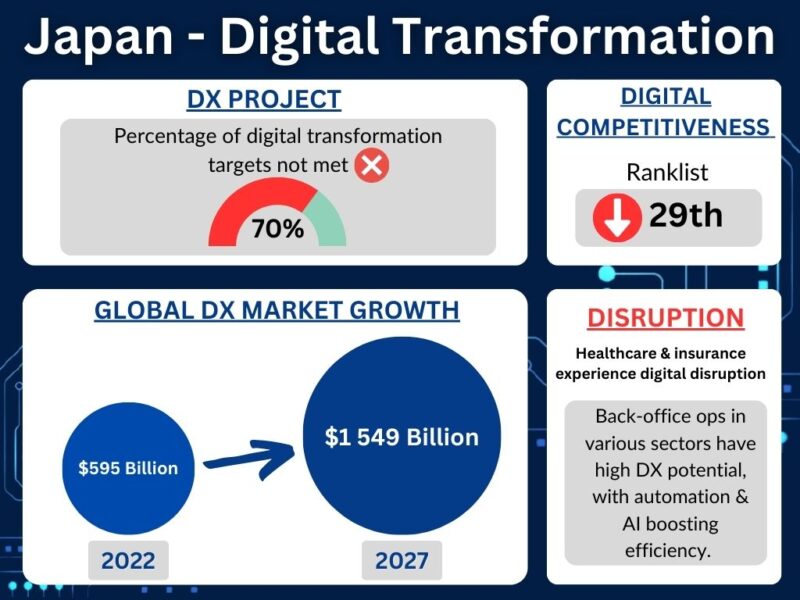Is Japan Finally Ready to Embrace Digital Transformation?

If we are in fact currently experiencing the fourth industrial revolution, then a core element of it is digital transformation (DX or DT). Determining whether such shifts are as seismic as they seem, and the names by which they will eventually be known, usually requires the perspective of time.
As the late scientist and futurist Roy Amara succinctly put it, “We tend to overestimate the effect of a technology in the short run and underestimate the effect in the long run.”
But whatever the eventual historical verdict, there is no doubt that digital technology is advancing at an unprecedented pace.
Growing pains
Genuine DX goes beyond the digitisation of data and the digitalisation of business processes to implementing fundamentally novel strategies and integrating digital tech into all areas of operations. Significant progress is being made along the DX path, a journey that was accelerated by the pandemic, but there remains a long way to go. And it won’t all be plain sailing. Indeed, separate studies by McKinsey and Boston Consulting Group both found that around 70% of digital transformation projects still fall short of their goals.
Nevertheless, the global DX market is predicted to grow from $595 billion last year to $1,549 billion by 2027, according to MarketsandMarkets.
Japan, in spite of the establishment of a dedicated Digital Agency in September 2021, and the talk of ‘Society 5.0’ from the Kishida administration, continues to lose ground on its peers in the digital realms.
In the 2022 IMD World Digital Competitiveness ranking, Japan slipped one place to 29th out of 63 countries, coming in at a particularly poor 62nd for business agility and 50th for talent in the sub-rankings. On more positive notes, it ranked 8th for technological framework and 14th for science concentration, though both of those also represent slight drops over recent years. This is not of course to say that Japan is not progressing (or going backwards), but that other nations are moving ahead at a faster clip.
Both in Japan and across the globe, one of the areas with a great deal of DX potential are back-office operations in multiple sectors. Increased automation and deployment of artificial intelligence will see numerous back-office tasks such as accounting, invoicing, and payroll made markedly more efficient and streamlined. In parallel with this shift, there will be an increasing emphasis on roles involved in data analysis and cybersecurity, along with specialists who can oversee the new systems.
Ensuring progress
Insurance is one of the businesses where back-office functions will be revolutionised by the digital shift, which will also sweep changes throughout other aspects of the industry. Japan’s insurance sector remains heavily paper based, a piece of low-hanging fruit in the DX stakes.
Tech such as AI and blockchain are now being used to deliver innovations including smart insurance contracts and pay outs that are automatically executed or triggered when certain conditions are met.
Further advances could deliver fully customised policies for an individual’s or company’s precise situation at a given time. As the Internet of Things (IoT) connects an ever-expanding legion of devices, this is already becoming reality.
Aioi Nissay Dowa Insurance is partnered with a US tech firm to offer car insurance based on individual driving data relayed from policyholders’ vehicles via a sensor and smartphone. Similarly, life and health insurance based on real-time readings from wearables should be more efficient, accurately assessed and so more equitable than anything that depends on self-reported lifestyle habits or data from yearly check-ups.
Digital doctoring
Healthcare is also undergoing profound changes driven by digital tech. There are already enough wearables and other connected devices for them to be categorised as an Internet of Medical Things (IoMT) subset of IoT. In addition, growing deployment of innovations like robotic and VR-assisted surgery, AI-powered drug discovery and big data analysis for healthcare solutions will further transform the sector.
Overall, Japan has a way to go in order to catch up with its peers in the DX race, as evidenced by its declining digital competitiveness ranking. Added to risk-averse tendencies, some of the lack of impetus for drastic change in Japan can probably be explained by a level of satisfaction with the status quo. The nation is blessed with a highly effective universal healthcare system, properly functioning infrastructure and superlative customer service.
But worsening demographics, deteriorating public finances and the shrinking domestic market are providing growing incentives to undertake genuine change. DX will be a major piece of this puzzle. And those capable of navigating the new paths ahead will be essential across multiple sectors and divisions in organisations within them.
By: Gavin Blair
We are currently looking for DX Consultants, AI Experts, Data Scientists and Cloud Engineers.
To find out more about hot roles in IT and elsewhere please contact us at +81-3-5962-5888 or email us at info@slate.co.jp

